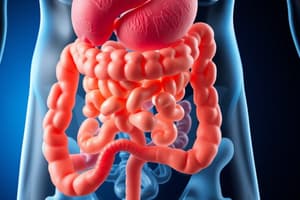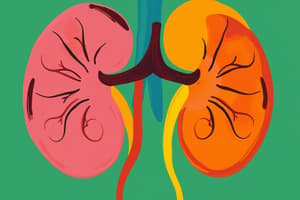Podcast
Questions and Answers
Which organ is primarily responsible for filtering waste products and toxins from the bloodstream?
Which organ is primarily responsible for filtering waste products and toxins from the bloodstream?
- Large intestine
- Kidneys (correct)
- Liver
- Lungs
What is the primary function of the liver in the excretory system?
What is the primary function of the liver in the excretory system?
- Secreting hormones
- Removing excess water
- Detoxifying nitrogenous wastes (correct)
- Filtering blood
Which organ is responsible for removing decomposed hemoglobin and lipophilic substances from the body?
Which organ is responsible for removing decomposed hemoglobin and lipophilic substances from the body?
- Large intestine (correct)
- Liver
- Lungs
- Kidneys
What is the primary function of the skin in the excretory system?
What is the primary function of the skin in the excretory system?
Which organ is responsible for removing carbon dioxide from the bloodstream during respiration?
Which organ is responsible for removing carbon dioxide from the bloodstream during respiration?
What is the primary function of the excretory system?
What is the primary function of the excretory system?
Which organs are primarily involved in the human excretory system?
Which organs are primarily involved in the human excretory system?
How does the excretory system contribute to homeostasis?
How does the excretory system contribute to homeostasis?
Why does the excretory system produce hypotonic urine when there is excess water in the body?
Why does the excretory system produce hypotonic urine when there is excess water in the body?
What is the role of the muscular system in influencing the excretory system?
What is the role of the muscular system in influencing the excretory system?
Flashcards are hidden until you start studying
Study Notes
Excretion: Understanding the Excretory System
The excretory system plays a critical role in maintaining the health of an organism by helping to regulate the body's internal environment. This system is responsible for removing waste products and toxins from the body, ensuring that the body maintains the correct balance of water, minerals, and electrolytes.
Excretory System Definition
The excretory system involves a group of organs that work together to eliminate waste products and toxins from the body. In humans, the primary organs involved are the kidneys and bladder, which serve as the mechanism for removing urea and other waste products from the bloodstream and storing them in the urine until they are expelled from the body.
Overview
In humans, the excretory system performs several important functions beyond waste removal. It also helps maintain internal homeostasis by regulating fluid balance and maintaining appropriate levels of water and electrolytes within the body. Additionally, parts of the excretory system are influenced by other organ systems, such as the muscular system and skeletal system, which can impact kidney function and the overall health of the individual.
Excretory System Function
The excretory system plays a crucial role in maintaining the fluid balance of the body, ensuring adequate salt and water levels. When there is excess water, the kidneys produce hypotonic urine to remove it from the body. Conversely, when an individual consumes salty food or loses water through perspiration, the concentration of urine is increased to preserve osmolarity in the body fluids.
Excretory System Organs
The primary excretory organs in humans are the kidneys, which filter waste products and toxins from the bloodstream. These organs also serve other functions beyond filtration, such as secreting hormones that regulate red blood cell production in the bones.
In addition to the kidneys, other organs contribute to the excretion process. For example, the liver plays a crucial role in detoxification, especially for nitrogenous wastes like ammonia, converting them into less toxic substances before they are transported to the kidneys for elimination. The large intestine contributes to excretion by removing decomposed hemoglobin and lipophilic substances from the body through feces.
Secondary excretory organs include the skin, lungs (or gills), and various glands. The skin can remove salts and excess water through sweat secreted by sweat glands. The lungs facilitate gas exchange, removing carbon dioxide from the bloodstream during respiration, and the liver plays a role in converting ammonia into less toxic substances like urea for excretion.
Conclusion
The excretory system is essential for maintaining the overall health of an organism. By removing waste products and toxins from the body, ensuring proper fluid balance, and working in conjunction with other systems, it helps maintain homeostasis within the body. Understanding the functions and organs involved in this complex process provides valuable insight into how our bodies function and maintain their internal environment.
Studying That Suits You
Use AI to generate personalized quizzes and flashcards to suit your learning preferences.




